Grievance Letter Against Manager
[Your Name]
[Your Address]
[City, State, ZIP Code]
[Email Address]
[Phone Number]
[Date]
[Manager's Name]
[Manager's Position]
[Company Name]
[Company Address]
[City, State, ZIP Code]
Dear [Manager's Name],
I am writing this letter to formally address some concerns and grievances that I have been experiencing under your management. I believe that open communication is essential for maintaining a positive work environment, and I hope that we can work together to address these issues for the betterment of the team and the company as a whole.
I would like to outline the specific grievances I have encountered:
1. Lack of Communication: I have noticed a significant gap in communication between your management team and the rest of the employees. Important updates, changes in procedures, and project expectations have not been adequately communicated, leading to confusion and inefficiencies.
2. Unequal Treatment: I have observed instances where certain team members seem to receive preferential treatment, leading to a sense of unfairness and demotivation among those who are not receiving the same opportunities or recognition.
3. Micromanagement: There have been instances where I have felt micromanaged, which has affected my ability to work independently and contribute effectively to the team. I believe that a healthy level of trust and autonomy is crucial for the success of any project.
4. Lack of Professional Development: Despite expressing my interest in professional development opportunities, I have not received adequate support or guidance from you or the management team. This has hindered my growth within the company and my ability to contribute to projects effectively.
5. Inadequate Feedback: Constructive feedback is crucial for personal and professional growth. However, I have not received consistent or meaningful feedback on my performance, which has made it challenging for me to understand areas for improvement and development.
I want to emphasize that my intention in bringing these grievances to your attention is not to create conflict but to foster a healthier and more productive work environment for everyone. I believe that by addressing these concerns, we can create a positive atmosphere that allows all team members to thrive and contribute their best.
I kindly request a meeting at your earliest convenience to discuss these matters further and work towards finding viable solutions. I am open to engaging in a constructive dialogue to resolve these issues and improve our working relationship.
Thank you for taking the time to read this letter. I look forward to your prompt response and the opportunity to address these concerns together.
Sincerely,
[Your Name]
[Your Employee ID, if applicable]
Formal Grievance Letter for Workplace Harassment
Subject: Formal Grievance Against Manager - Workplace Harassment
Dear [HR Director/Recipient Name],
I am writing to file a formal grievance against my direct manager, [Manager's Name], regarding ongoing workplace harassment that has significantly impacted my ability to perform my duties and has created a hostile work environment.
Over the past [time period], I have experienced the following incidents: [Describe specific incidents with dates, times, witnesses, and detailed descriptions of what occurred]. These behaviors include [inappropriate comments/discriminatory remarks/intimidation/other specific behaviors].
I have attempted to address this matter informally by [describe any previous attempts], but the situation has not improved and has, in fact, escalated.
This conduct violates company policy on [cite specific policies] and has caused me significant distress, affecting both my professional performance and personal well-being.
I am requesting that the company conduct a thorough investigation into these allegations and take appropriate disciplinary action. I am available to provide additional documentation, witness statements, and further details as needed.
I expect this matter to be handled with the utmost confidentiality and professionalism. Please acknowledge receipt of this grievance and inform me of the next steps in the process.
Sincerely,
[Your Name]
[Your Position]
[Date]
[Employee ID]
Professional Grievance Letter for Unfair Treatment
Subject: Formal Complaint Regarding Unfair Treatment
Dear [HR Manager/Appropriate Authority],
I am submitting this formal grievance concerning unfair treatment I have been subjected to by my manager, [Manager's Name], in my role as [Your Position].
Since [date/time period], I have been treated differently from my colleagues in the following ways: [unequal work distribution/denied opportunities/unfair performance evaluations/exclusion from meetings/other specific examples]. For instance, [provide 2-3 specific examples with dates and context].
This differential treatment has no basis in my performance record, which shows [mention your achievements, positive reviews, or consistent performance]. Despite my qualifications and contributions, I have been [passed over for promotion/denied training opportunities/assigned less favorable projects/other specific impacts].
I believe this treatment constitutes a violation of [company's equal treatment policy/fair employment practices] and may constitute discrimination based on [if applicable: age/gender/race/other protected characteristic].
I have documented these incidents thoroughly and can provide supporting evidence including [emails/performance reviews/witness testimony/other documentation].
I am requesting an immediate investigation into this matter and a meeting with HR to discuss resolution options, including [potential remedies you're seeking: fair evaluation/equal opportunities/transfer to different department/other solutions].
Please confirm receipt of this grievance within [reasonable timeframe] and provide me with a timeline for the investigation process.
Respectfully,
[Your Name]
[Department]
[Contact Information]
[Date]
Serious Grievance Email for Bullying and Intimidation
Subject: URGENT - Formal Grievance: Workplace Bullying
Dear [HR Director/Senior Management],
I am filing an urgent formal grievance against [Manager's Name] for persistent bullying and intimidation that has made my work environment unbearable.
The bullying behaviors include: public humiliation during team meetings, shouting and aggressive behavior, undermining my work in front of colleagues, setting impossible deadlines while withholding necessary resources, and making threatening remarks about my job security.
Specific incidents include:
- [Date]: [Detailed description of incident, location, witnesses]
- [Date]: [Detailed description of incident, location, witnesses]
- [Date]: [Detailed description of incident, location, witnesses]
This systematic pattern of behavior has caused me severe stress, anxiety, and has affected my health. I have [sought medical attention/taken sick leave/experienced sleep problems] as a direct result of this treatment.
I have kept contemporaneous notes of all incidents, saved relevant emails and messages, and have identified colleagues who have witnessed this behavior and are willing to provide statements.
This conduct violates the company's dignity at work policy and anti-bullying procedures. I am requesting immediate intervention, including temporary reporting structure changes while this matter is investigated, to ensure my safety and well-being.
I need a response within 48 hours acknowledging this grievance and outlining the immediate steps that will be taken.
Urgently,
[Your Name]
[Position/Department]
[Date]
[Contact Number]
Formal Letter for Retaliation After Raising Concerns
Subject: Grievance - Retaliation Following Protected Activity
Dear [Senior HR Manager/Executive],
I am filing this formal grievance to report retaliation by my manager, [Manager's Name], following my protected activity of [reporting safety concerns/filing a previous complaint/requesting reasonable accommodation/whistleblowing/other protected activity].
On [date], I [describe the protected activity you engaged in]. Since that time, I have experienced the following retaliatory actions:
- Sudden negative performance reviews despite consistent previous positive evaluations
- Exclusion from important projects and meetings
- Increased scrutiny and micromanagement
- Hostile and cold treatment
- [Other specific retaliatory behaviors with dates]
The timing and nature of these actions clearly demonstrate a retaliatory pattern. Prior to [date of protected activity], my relationship with [Manager's Name] was professional, and my performance reviews were [positive/satisfactory]. The dramatic shift in treatment immediately following my [protected activity] indicates retaliation.
Retaliation for engaging in protected activities is illegal under [relevant legislation] and violates company policy. I have documented evidence including [performance reviews, emails, witness statements, records of meetings].
I am requesting:
1. An immediate investigation into this retaliation
2. Cessation of all retaliatory behavior
3. Restoration of my professional standing
4. Protection from further retaliation during and after the investigation
5. Appropriate disciplinary action against [Manager's Name]
I reserve all rights under applicable law and company policy. Please provide written acknowledgment of this grievance and outline the investigation process within five business days.
Sincerely,
[Your Name]
[Employee ID]
[Date]
[Contact Information]
Professional Grievance Message for Breach of Contract
Subject: Formal Grievance - Breach of Employment Contract
Dear [HR Department/Appropriate Authority],
I am writing to file a formal grievance against my manager, [Manager's Name], regarding multiple breaches of my employment contract and agreed-upon terms of employment.
My employment contract, dated [date], specifies the following terms that have been violated:
- Work hours: [contracted hours] vs. [actual required hours without compensation]
- Job responsibilities: [contracted duties] vs. [additional uncompensated duties assigned]
- Reporting structure: [contracted arrangement] vs. [actual arrangement]
- [Other relevant contractual terms that have been breached]
Despite repeated verbal requests to honor my contractual terms, [Manager's Name] has continued to require me to [work excessive hours/perform duties outside my role/other violations]. This has occurred on the following occasions: [list specific dates and circumstances].
I have copies of my original employment contract, email correspondence requesting adherence to contract terms, and records of [hours worked/tasks performed/other relevant documentation].
These breaches have resulted in [impact on work-life balance/financial loss/career development issues/other consequences].
I am seeking:
- Immediate compliance with my contractual terms
- Compensation for [overtime worked/additional responsibilities undertaken]
- A formal acknowledgment that my contract will be respected going forward
- A meeting to discuss how to prevent future violations
Please investigate this matter and respond within [reasonable timeframe] with a proposed resolution.
Regards,
[Your Name]
[Position]
[Date]
[Employee Number]
Heartfelt Yet Professional Grievance Letter for Toxic Management
Subject: Formal Grievance Concerning Management Conduct
Dear [HR Manager/Senior Leadership],
I am writing this letter with great difficulty, as I have always been committed to this organization and proud of my contributions. However, I can no longer remain silent about the toxic management practices of [Manager's Name] that have deeply affected me and my colleagues.
When I joined this company [time period ago], I was enthusiastic and motivated. Over time, the management style of [Manager's Name] has eroded that enthusiasm and created an environment where fear and negativity prevail over collaboration and respect.
The specific concerns I am raising include:
- Creating an atmosphere of fear where employees are afraid to speak up or share ideas
- Playing favorites and creating divisions within the team
- Taking credit for team members' work while publicly blaming them for any failures
- Inconsistent and arbitrary decision-making that leaves employees confused and anxious
- Showing disrespect through dismissive comments, eye-rolling, and condescending tone
I have witnessed talented colleagues leave the organization, and morale within our team is at an all-time low. This is not just my perception; [mention if others share concerns, exit interview feedback, or observable impacts like turnover].
I care about this organization and want to see it succeed, which is why I am bringing this forward. I believe that with proper leadership and a healthier management approach, our team could thrive.
I am requesting a confidential investigation into the management practices within our department and consideration of leadership coaching, management training, or restructuring as appropriate.
I remain committed to my role and hope that this grievance will lead to positive changes for everyone.
With sincere hope for improvement,
[Your Name]
[Position]
[Date]
Formal Grievance Email for Discrimination
Subject: Formal Grievance - Discrimination
Dear [HR Director/Equal Opportunity Officer],
I am filing a formal grievance against my manager, [Manager's Name], for discrimination based on [protected characteristic: age/gender/race/religion/disability/sexual orientation/other].
I have been subjected to discriminatory treatment as evidenced by the following:
- [Specific discriminatory comments made, with dates and witnesses]
- [Discriminatory actions taken, such as denied opportunities, unfair treatment]
- [Pattern of behavior that demonstrates discriminatory intent]
For example:
On [date], [Manager's Name] [describe specific incident in detail]
On [date], [describe another specific incident]
Additionally, [describe pattern or ongoing behavior]
This treatment stands in stark contrast to how [Manager's Name] treats other employees who do not share my [protected characteristic]. Specifically, [provide comparison examples showing differential treatment].
This discrimination has materially affected my employment through [denied promotion/unfavorable assignments/hostile environment/other impacts].
I have documentation including [emails/messages/performance reviews/witness statements/other evidence] that supports my allegations.
This conduct violates [Equal Employment Opportunity laws/company anti-discrimination policy/other relevant regulations] and creates an unlawful hostile work environment.
I am requesting:
1. An immediate and thorough investigation
2. Interim measures to protect me from further discrimination
3. Appropriate disciplinary action
4. Remedial action to address the impacts of discrimination
5. Monitoring to ensure no retaliation
Please acknowledge receipt of this grievance immediately and provide information about the investigation process, timeline, and my rights during this process.
Respectfully,
[Your Name]
[Employee ID]
[Date]
[Contact Information]
Professional Grievance Letter for Denied Leave and Time-Off Requests
Subject: Formal Grievance - Unreasonable Denial of Leave Requests
Dear [HR Manager],
I am submitting a formal grievance regarding the repeated and unreasonable denial of my leave requests by my manager, [Manager's Name].
According to company policy and my employment contract, I am entitled to [number] days of annual leave. Despite submitting requests well in advance and following all proper procedures, my requests have been consistently denied without valid justification.
Details of denied requests:
- [Date requested]: [Purpose of leave] - Requested on [date] for [dates] - Denied because [reason given or no reason provided]
- [Date requested]: [Purpose of leave] - Requested on [date] for [dates] - Denied because [reason given or no reason provided]
- [Date requested]: [Purpose of leave] - Requested on [date] for [dates] - Denied because [reason given or no reason provided]
Meanwhile, I have observed that other team members' leave requests have been approved, including requests submitted with less notice and during similarly busy periods. This differential treatment appears arbitrary and unfair.
The denial of my leave has resulted in [inability to attend important family event/forfeiture of non-refundable bookings/inability to address personal matters/other impacts]. Additionally, I have accrued [number] days of unused leave that I am at risk of losing.
The right to take earned leave is a fundamental employment right. The pattern of denials appears to be [based on personal bias/retaliatory/discriminatory/other characterization].
I am requesting:
- Approval of my pending leave request for [dates]
- A clear explanation of the criteria used for leave approval decisions
- Assurance that future leave requests will be evaluated fairly and in accordance with policy
- Permission to use my accrued leave before it expires
Please respond within [reasonable timeframe] with a decision and explanation.
Sincerely,
[Your Name]
[Department]
[Date]
What is a Grievance Letter Against a Manager and Why File One
A grievance letter against a manager is a formal written complaint submitted to an employer's human resources department or senior management that documents workplace concerns, mistreatment, policy violations, or management misconduct. This official document serves multiple purposes:
- Creates a formal record of workplace issues that may be used in legal proceedings or internal investigations
- Activates the company's grievance procedure and obligates the employer to investigate
- Protects the employee from retaliation by establishing a documented complaint
- Provides a clear, detailed account of incidents that might otherwise be dismissed or forgotten
- Demonstrates that the employee attempted to resolve issues through proper channels
- May be required before pursuing legal action or regulatory complaints
- Helps establish patterns of behavior when multiple employees experience similar issues
- Forces the organization to acknowledge and address problems that informal complaints haven't resolved
When Should You File a Grievance Letter Against Your Manager
Filing a grievance is appropriate in these specific situations:
- Harassment or bullying: Persistent intimidation, verbal abuse, public humiliation, or aggressive behavior
- Discrimination: Unfair treatment based on protected characteristics like age, gender, race, religion, disability, or sexual orientation
- Retaliation: Punishment for whistleblowing, filing previous complaints, or engaging in protected activities
- Breach of contract: Violations of employment agreement terms including hours, pay, duties, or working conditions
- Unfair treatment: Biased performance reviews, denied opportunities, unequal workload distribution, or favoritism
- Denied leave: Unreasonable refusal of time-off requests or interference with rightful leave entitlements
- Safety violations: Manager requiring unsafe work practices or ignoring legitimate safety concerns
- Wage theft: Unpaid overtime, improper deductions, or failure to pay agreed compensation
- Privacy violations: Unauthorized sharing of personal information or inappropriate monitoring
- Toxic environment: Creating a hostile workplace through consistent negative behavior affecting team morale
- Professional sabotage: Deliberately undermining your work, withholding resources, or blocking career advancement
- After informal resolution fails: When direct conversations or informal complaints haven't produced results
Who Should File a Grievance Letter Against a Manager
The following individuals have standing to file a formal grievance:
- Current employees experiencing direct mistreatment from their immediate or indirect manager
- Team members who witness misconduct affecting themselves and colleagues
- Probationary employees who are not exempt from workplace protections despite their temporary status
- Part-time or contract workers who are protected under employment laws and company policies
- Returning employees addressing issues that occurred before a leave of absence
- Any employee regardless of position, tenure, or seniority who experiences policy violations
- Employees who previously raised concerns informally and did not receive adequate response
- Workers experiencing retaliation after whistleblowing or raising previous concerns
- Individuals with documentation who can substantiate their claims with evidence
- Those who have exhausted informal channels including direct communication with the manager or skip-level meetings
Note: The letter should come directly from the affected employee, though they may seek advice from legal counsel, union representatives, or employee advocates when drafting it.
Requirements and Prerequisites Before Filing Your Grievance
Before submitting a formal grievance letter, ensure you have:
- Reviewed company policies: Read the employee handbook, grievance procedures, and relevant workplace policies
- Documented everything: Collected dates, times, locations, witnesses, and detailed descriptions of incidents
- Gathered evidence: Compiled emails, messages, performance reviews, witness statements, and any relevant documentation
- Attempted informal resolution: Made reasonable efforts to address issues directly (unless unsafe to do so)
- Checked timelines: Verified any deadlines for filing grievances under company policy or applicable laws
- Identified the appropriate recipient: Determined whether to send the letter to HR, senior management, or a specific compliance officer
- Reviewed your employment contract: Understood your rights, obligations, and any arbitration or mediation clauses
- Consulted policies on protected activities: Confirmed that filing a grievance is protected from retaliation
- Considered your goals: Clarified what outcome you're seeking from the grievance process
- Sought advice if needed: Consulted with legal counsel, union representatives, or employee advocacy organizations
- Backed up evidence: Made copies of all documentation in case of device failure or access restrictions
- Prepared for the process: Understood that investigations take time and may require your participation
- Assessed personal readiness: Considered the emotional and professional implications of filing
How to Write and Submit an Effective Grievance Letter
Follow this systematic approach when preparing your grievance:
- Use formal business letter format: Include date, recipient information, subject line, and professional greeting
- State your purpose immediately: Clearly identify the letter as a formal grievance in the subject and opening
- Identify all parties: Name yourself, your manager, your position, and relevant witnesses
- Provide chronological details: List incidents in order with specific dates, times, and locations
- Be specific and factual: Avoid emotional language; stick to objective descriptions of what occurred
- Cite policy violations: Reference specific company policies, employment laws, or contractual terms that were breached
- Describe impact: Explain how the conduct affected your work, health, career, or well-being
- Include evidence: Reference attached documentation or offer to provide additional materials
- State your desired outcome: Clearly request investigation, remedial action, or specific resolutions
- Request timeline: Ask for acknowledgment within a reasonable timeframe and information about the process
- Keep copies: Retain copies of the letter and all attachments for your records
- Choose delivery method: Submit via email with read receipt, certified mail, or hand-delivery with receipt
- Follow up: Send a polite follow-up if you don't receive acknowledgment within the stated timeframe
- Maintain professionalism: Keep tone respectful even when describing serious misconduct
Formatting Guidelines for Your Grievance Letter
Proper formatting enhances credibility and ensures your grievance is taken seriously:
- Length: Typically 1-3 pages; detailed enough to convey all relevant information but concise enough to maintain reader attention
- Tone: Professional, serious, factual, and respectful regardless of the severity of your complaints
- Font and layout: Use standard business fonts (Arial, Times New Roman, Calibri) in 11-12pt size with 1-inch margins
- Structure: Include clear subject line, formal greeting, organized body paragraphs, professional closing, and signature
- Language: Use clear, direct language; avoid jargon, profanity, or overly emotional expressions
- Numbering: Consider numbering multiple incidents or allegations for easy reference during investigations
- Attachments: Label and organize supporting documents clearly; reference them in the letter body
- Delivery mode: Email for speed and documentation, or certified mail for formal legal record
- File format: PDF for official submission to prevent alterations; keep editable version for your records
- Subject line: Make it clear and specific: "Formal Grievance Against [Manager Name]" or "Official Complaint - [Issue]"
- Contact information: Include multiple ways to reach you (work email, personal email, phone number)
- Confidentiality note: Request confidential handling if appropriate, though recognize complete confidentiality may not be possible during investigation
To Whom Should You Address Your Grievance Letter
Selecting the correct recipient is critical for proper handling:
- Human Resources Department: The most common and appropriate recipient for management grievances
- HR Director or HR Manager: Specific person rather than general department when possible
- Senior Management: Your manager's supervisor or department head, particularly if HR is unresponsive
- Compliance Officer: For issues involving legal violations, discrimination, or regulatory matters
- Equal Employment Opportunity (EEO) Officer: Specifically for discrimination or harassment complaints
- Ethics Hotline or Ombudsperson: If your company has these resources for confidential reporting
- Chief Executive Officer or President: In small companies without formal HR departments
- Board of Directors: In extreme cases involving senior management misconduct or company-wide issues
- Union Representatives: If you're in a unionized workplace with collective bargaining agreements
- Multiple recipients: Consider copying senior leadership or legal department for serious matters
- External agencies: File with EEOC, labor boards, or regulatory agencies if internal processes fail or for parallel reporting
- Avoid: Never send only to the manager you're complaining about or their direct supervisor exclusively
What to Do After Sending Your Grievance Letter
Your responsibilities don't end with submission:
- Confirm receipt: Follow up within 2-3 business days if you haven't received acknowledgment
- Document everything: Keep records of all communications related to your grievance
- Be available: Respond promptly to investigation requests, interview invitations, or information requests
- Cooperate fully: Provide additional information, evidence, or clarification as requested by investigators
- Maintain confidentiality: Don't discuss the grievance unnecessarily; share only with those who need to know
- Continue working professionally: Maintain job performance and professional conduct throughout the process
- Avoid retaliation: Don't engage in retaliatory behavior toward your manager or colleagues
- Report further incidents: Document and report any new instances of misconduct or retaliation immediately
- Keep personal copies: Store all grievance-related documents in a safe location outside company systems
- Set reminders: Monitor investigation timelines and follow up if deadlines pass without updates
- Seek support: Consider counseling, employee assistance programs, or support groups to manage stress
- Review interim arrangements: Request temporary reporting structure changes if continued interaction is harmful
- Prepare for outcomes: Understand possible resolutions including mediation, disciplinary action, or policy changes
- Know your rights: Research your legal options if the internal process doesn't produce satisfactory results
Pros and Cons of Filing a Grievance Against Your Manager
Advantages:
- Creates official record that can be used in legal proceedings or unemployment claims
- Triggers mandatory investigation and organizational response
- Protects you from retaliation under whistleblower and anti-retaliation laws
- May result in resolution of the problem and improved working conditions
- Holds management accountable for misconduct
- Can help other employees experiencing similar issues
- Demonstrates you attempted to resolve issues through proper channels
- May lead to positive organizational changes in policies or training
- Validates your experience and concerns formally
Disadvantages:
- May create tension or awkwardness in your workplace
- Investigation process can be lengthy and stressful
- Outcomes may not meet your expectations or desired resolution
- Risk of subtle retaliation despite legal protections
- Could impact your professional reputation or future opportunities within the company
- Requires time and emotional energy to participate in the investigation
- May damage relationships with colleagues who are interviewed or asked to provide statements
- Could result in transfer or restructuring that you didn't want
- No guarantee of confidentiality during investigation process
- Potential career implications if you're seen as "difficult" or "litigious"
Grievance Letters vs. Other Options for Addressing Manager Issues
Grievance Letter vs. Informal Complaint:
- Grievance: Official, documented, triggers formal investigation process
- Informal: Casual conversation, may not be recorded, less organizational obligation to act
- Use grievance when informal attempts fail or for serious violations
Grievance Letter vs. Direct Conversation with Manager:
- Grievance: Involves third party, creates record, appropriate for serious issues
- Direct conversation: May resolve misunderstandings quickly but lacks documentation
- Attempt direct conversation first for minor issues unless safety concerns exist
Grievance Letter vs. Skip-Level Meeting:
- Grievance: Formal process with HR involvement and investigative procedures
- Skip-level: Informal discussion with your manager's supervisor
- Skip-level can be preliminary step before formal grievance
Grievance Letter vs. Legal Action:
- Grievance: Internal company process, often required before external legal action
- Legal action: External, involves courts or agencies, more serious consequences
- Exhaust internal grievance procedures first unless emergency exists
Grievance Letter vs. Resignation:
- Grievance: Attempts to fix the problem while maintaining employment
- Resignation: Removes you from situation but doesn't address underlying issues
- Consider grievance first; constructive dismissal claims may require evidence of attempted resolution
Grievance Letter vs. Union Complaint:
- Grievance: May work alongside union processes in unionized workplaces
- Union: Provides representation and collective bargaining power
- Use both channels when available for maximum protection
Common Mistakes to Avoid When Filing a Grievance
- Being too emotional: Using angry, accusatory, or dramatic language that undermines credibility
- Lack of specificity: Making vague allegations without dates, examples, or concrete details
- Waiting too long: Delaying filing until the statute of limitations expires or evidence is lost
- No documentation: Filing without supporting evidence or records of incidents
- Skipping informal resolution: Not attempting to address issues directly when it would have been safe and appropriate
- Exaggerating or fabricating: Including false information that discredits legitimate complaints
- Making it personal: Attacking your manager's character rather than describing specific behaviors
- Including irrelevant information: Adding complaints about minor annoyances that dilute serious allegations
- Threatening legal action prematurely: Mentioning lawsuits before exhausting internal processes
- Discussing widely: Talking about your grievance with colleagues before filing, which could prejudice investigation
- Continuing misconduct: Engaging in policy violations yourself while complaining about your manager
- Ignoring deadlines: Missing filing windows specified in employee handbooks or collective bargaining agreements
- Wrong recipient: Sending to inappropriate person who can't act on the grievance
- No follow-up: Failing to confirm receipt or check on investigation progress
- Expecting immediate results: Becoming frustrated when thorough investigations take time
Essential Elements and Structure of a Grievance Letter
Every effective grievance letter must include:
- Header information: Your name, position, employee ID, department, and contact details
- Date: The date you're submitting the grievance
- Recipient details: Name, title, and department of the person receiving the grievance
- Subject line: Clear identification that this is a formal grievance and the general nature of the complaint
- Opening statement: Explicit declaration that you're filing a formal grievance against your manager
- Manager identification: Full name, title, and department of the manager you're complaining about
- Chronological incident description: Detailed account of what happened, when, where, and who witnessed it
- Policy or law citations: References to violated company policies, employment contract terms, or applicable laws
- Impact statement: Explanation of how the conduct affected you professionally, financially, emotionally, or physically
- Evidence references: List of attached documentation or available evidence supporting your claims
- Previous resolution attempts: Brief mention of any informal efforts to address the issue (if applicable)
- Desired outcome: Clear statement of what you're requesting (investigation, disciplinary action, policy changes, etc.)
- Request for timeline: Ask for acknowledgment deadline and estimated investigation duration
- Confidentiality request: Statement requesting discreet handling where appropriate
- Professional closing: Formal sign-off expressing expectation of fair treatment
- Signature: Your handwritten or electronic signature
- Attachments list: Inventory of all supporting documents included with the letter
Tips and Best Practices for Maximum Effectiveness
- Start documenting early: Keep a detailed journal of incidents as they occur rather than relying on memory
- Use the STAR method: Describe the Situation, Task, Action, and Result for each incident
- Be objective: Write as if you're a neutral third party describing what you observed
- Focus on patterns: Highlight systematic or repeated behavior rather than isolated incidents
- Quantify when possible: Use numbers (frequency of incidents, hours of unpaid overtime, etc.)
- Name witnesses: Identify colleagues who observed incidents and might corroborate your account
- Save everything digitally: Keep copies on personal devices and cloud storage, not just company systems
- Screenshot communications: Capture evidence of inappropriate messages or emails before they can be deleted
- Use company language: Reference specific policies, values, and procedures from your employee handbook
- Request interim measures: Ask for temporary changes to protect you during the investigation
- Consider timing strategically: File when you have complete documentation but before memories fade
- Get everything in writing: Confirm verbal conversations with follow-up emails summarizing what was discussed
- Maintain a paper trail: Document every interaction related to your grievance for future reference
- Stay factual under pressure: If interviewed, stick to observable facts rather than interpretations or assumptions
- Seek allies: Identify colleagues who've had similar experiences and might support your claims
Frequently Asked Questions About Filing Grievances Against Managers
Can I be fired for filing a grievance? Retaliation for filing a good-faith grievance is illegal and violates most company policies. However, document everything to protect yourself.
How long does the investigation take? Typically 2-8 weeks depending on complexity, though company policy may specify timelines. Request a timeline in your letter.
Will my grievance be kept confidential? Limited confidentiality is possible, but complete confidentiality cannot be guaranteed during an investigation that requires interviewing witnesses.
What if my company doesn't have an HR department? Address your grievance to the business owner, senior executive, or designated company officer responsible for employee relations.
Can I file anonymously? Anonymous complaints are difficult to investigate thoroughly. Some companies accept them but may not be able to act without identifiable information.
Should I hire a lawyer before filing? Not necessarily required for initial filing, but consultation can help ensure you're protecting your rights and documenting appropriately.
What happens if my grievance is not upheld? You may appeal internally, file with external agencies (EEOC, labor board), or consult an attorney about legal options.
Can I withdraw my grievance? Usually yes, but the company may continue investigating if they've uncovered policy violations or legal concerns.
Will I have to work with my manager during investigation? Request temporary reporting changes or work-from-home arrangements if continued interaction creates hardship.
What if multiple people have the same complaint? Multiple employees can file separate grievances or consider a collective complaint, which may carry more weight.

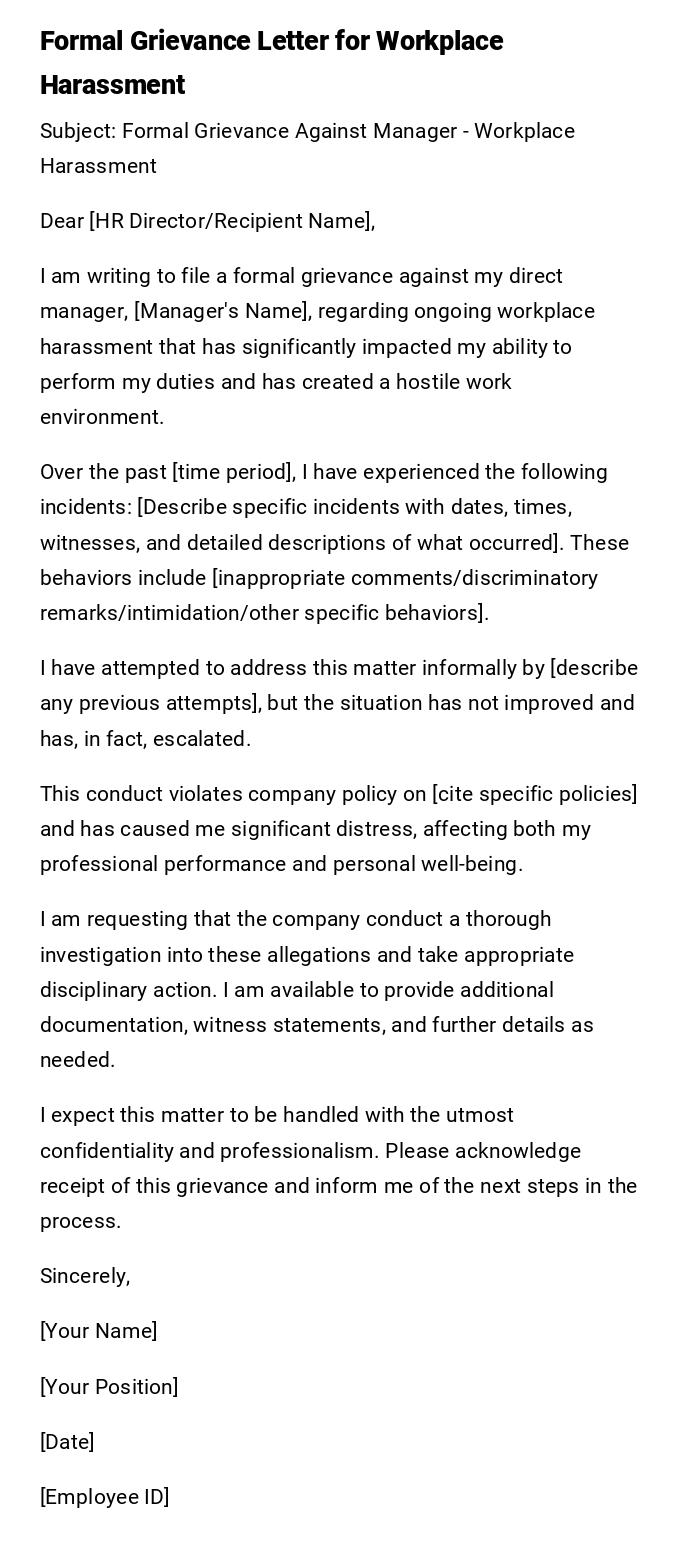
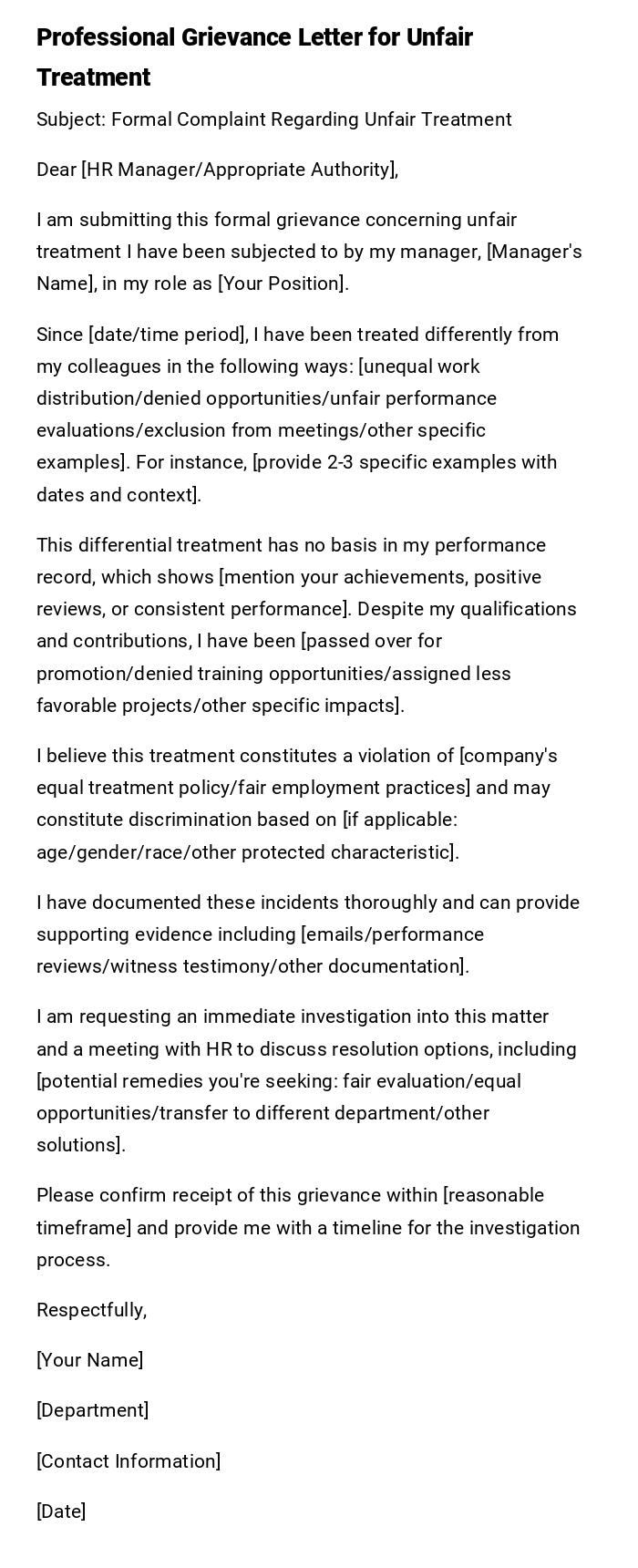
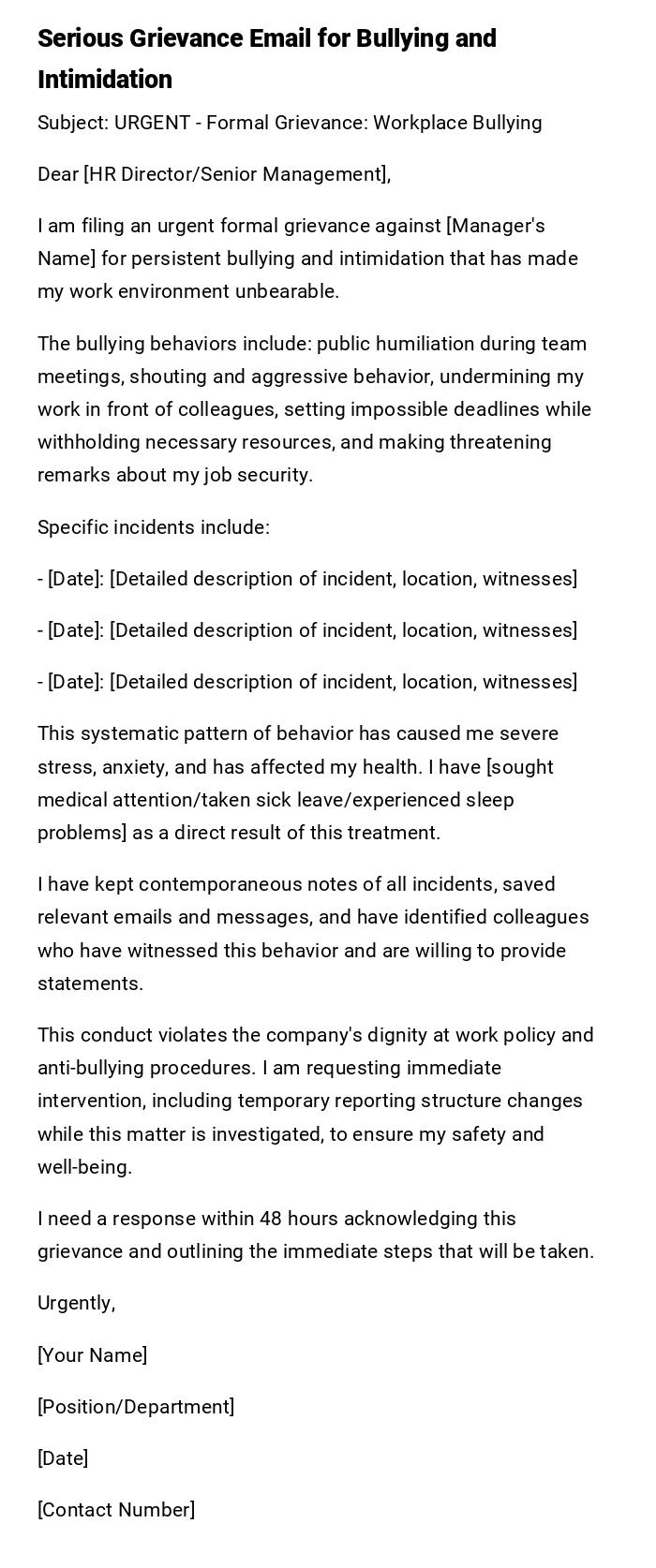
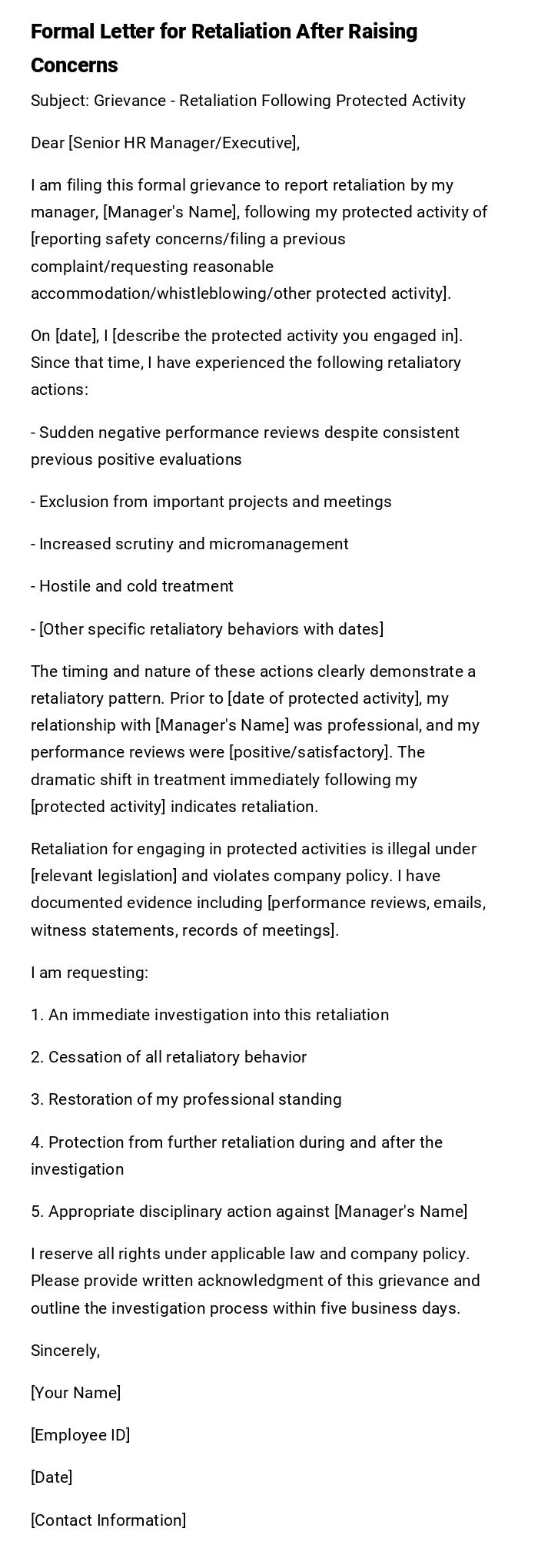
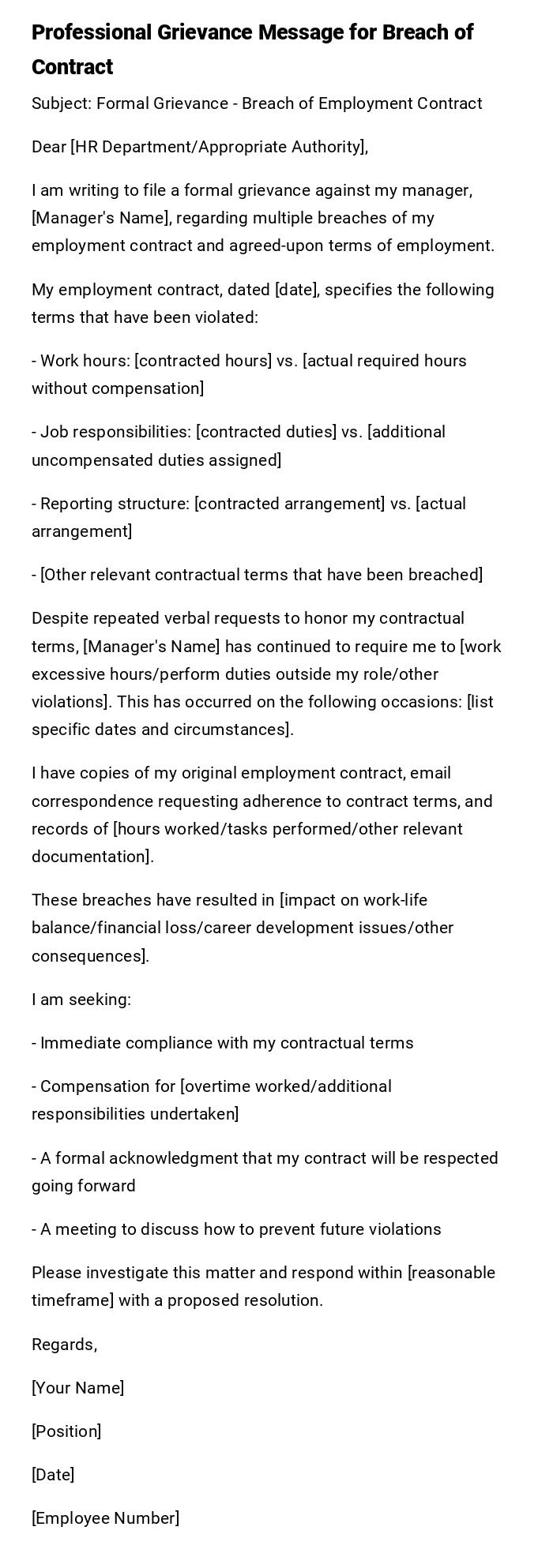
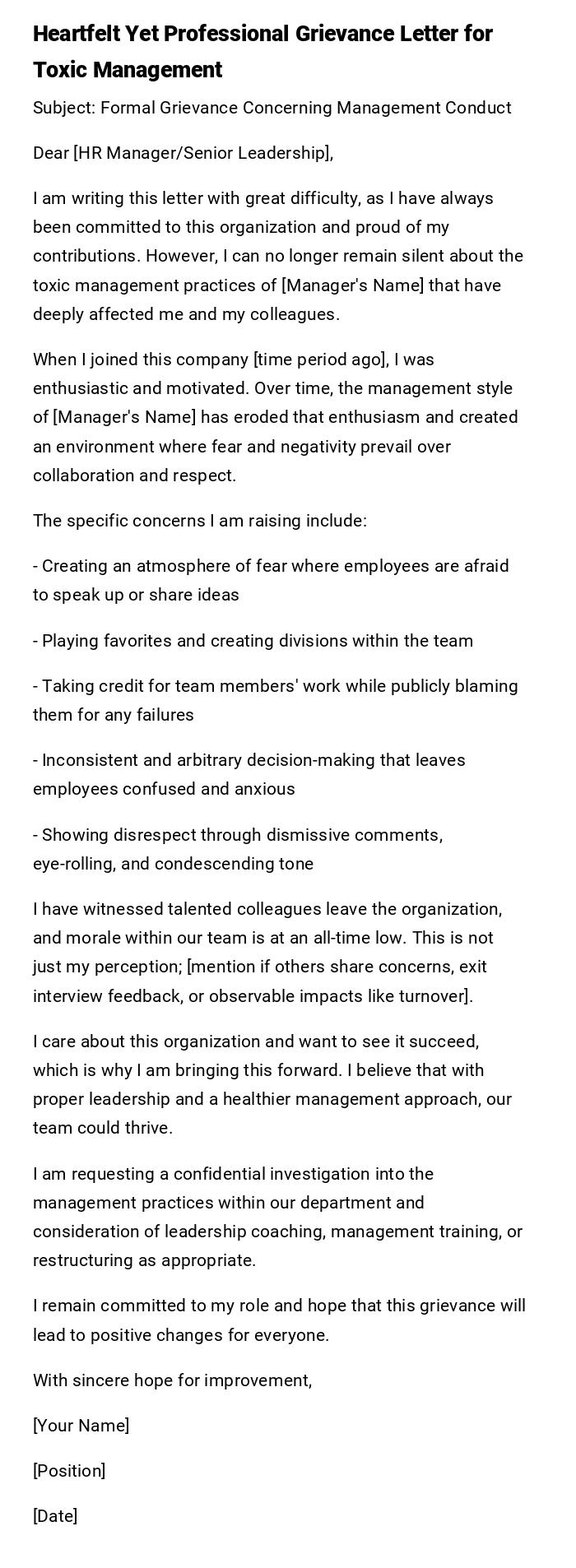

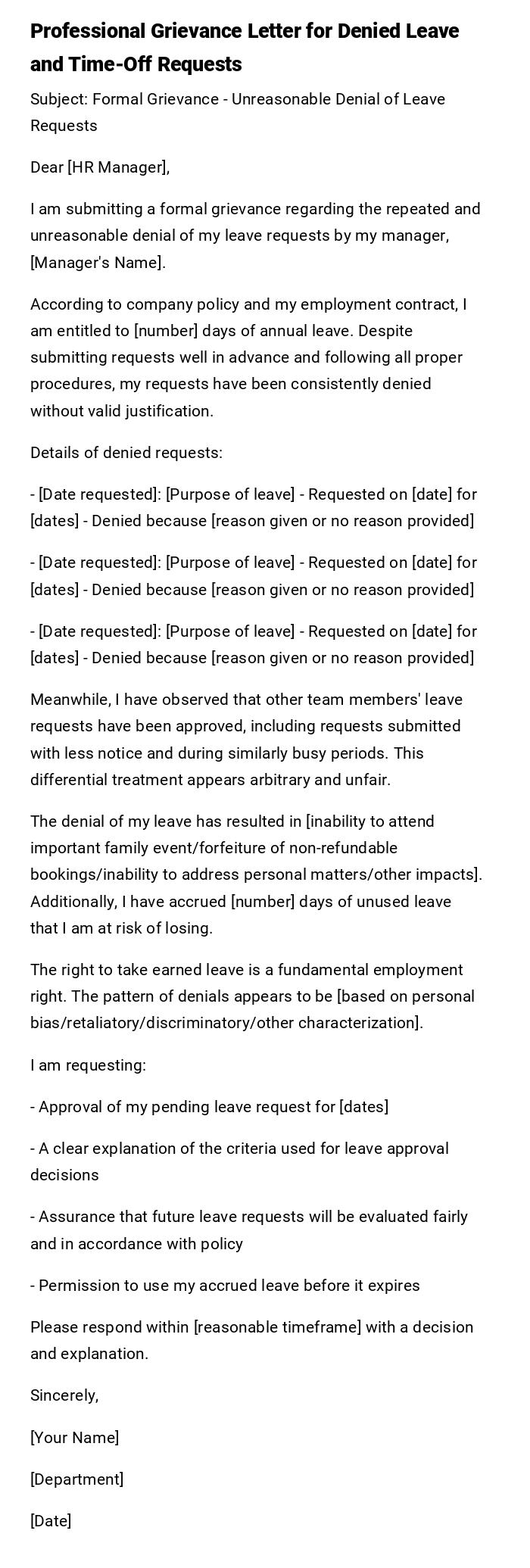

 Download Word Doc
Download Word Doc
 Download PDF
Download PDF